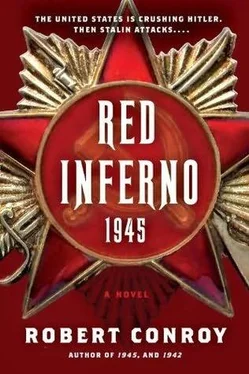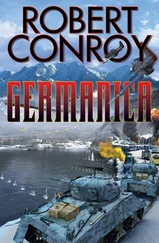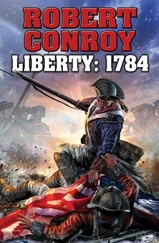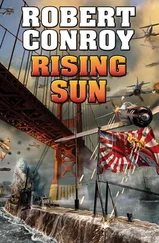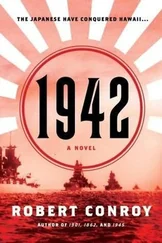Robert Conroy - Red Inferno
Здесь есть возможность читать онлайн «Robert Conroy - Red Inferno» весь текст электронной книги совершенно бесплатно (целиком полную версию без сокращений). В некоторых случаях можно слушать аудио, скачать через торрент в формате fb2 и присутствует краткое содержание. Жанр: Альтернативная история, на английском языке. Описание произведения, (предисловие) а так же отзывы посетителей доступны на портале библиотеки ЛибКат.
- Название:Red Inferno
- Автор:
- Жанр:
- Год:неизвестен
- ISBN:нет данных
- Рейтинг книги:4 / 5. Голосов: 1
-
Избранное:Добавить в избранное
- Отзывы:
-
Ваша оценка:
- 80
- 1
- 2
- 3
- 4
- 5
Red Inferno: краткое содержание, описание и аннотация
Предлагаем к чтению аннотацию, описание, краткое содержание или предисловие (зависит от того, что написал сам автор книги «Red Inferno»). Если вы не нашли необходимую информацию о книге — напишите в комментариях, мы постараемся отыскать её.
Red Inferno — читать онлайн бесплатно полную книгу (весь текст) целиком
Ниже представлен текст книги, разбитый по страницам. Система сохранения места последней прочитанной страницы, позволяет с удобством читать онлайн бесплатно книгу «Red Inferno», без необходимости каждый раз заново искать на чём Вы остановились. Поставьте закладку, и сможете в любой момент перейти на страницу, на которой закончили чтение.
Интервал:
Закладка:
They didn’t. The only Russians remaining were vast numbers of the dead and the dying. Those who could still move and who hadn’t already surrendered had fled to the east, leaving behind a scene of catastrophe unparalleled in scope. Tolliver had never seen so many dead bodies and so many ruined vehicles in one area before. He now realized that it was true-an entire Russian army had indeed been destroyed by this atomic bomb. Someday, he might feel truly sorry for them, but not now. He thought of dead Holmes and so many others whose lives were wasted by a war that, in his opinion, hadn’t had to happen.
A scientist in the lead jeep signaled a right turn, and the column obediently followed. Tolliver saw that they were skirting the actual center of the blast, now referred to as “ground zero.” If the bodies strewn about were any measure of the danger they were avoiding by detouring around ground zero, it was okay by him. This was yet another sight he would never forget and never be able to describe. Black death, black fire, black earth, and now the black stench of ruined bodies rotting in the summer sun. He noticed that birds were eating the dead. What effect would radiation have on them?
Someone in the second jeep yelled out that Zhukov was probably in there, in the center of this mess. If he was, thought Tolliver, he wasn’t going to be found and he sure as hell wasn’t coming out.
As they slowly circled ground zero they began to encounter survivors. Many of those trapped between ground zero and the American lines had already surrendered, while these pitiful remnants had been trying to make it east to supposed safety. The only thing was, they weren’t going to make it. Their wounds and burns were ghastly. The flesh had been destroyed, and some of the things crawling on the ground could scarcely be recognized as human.
The column did find signs of attempted mercy. Some few Russian doctors had set up hospitals, which had been overrun by the numbers of wounded.
Tolliver saw a light colonel named Burke leave his jeep and talk to a Russian doctor. The colonel then got on the radio and delivered an emphatic message. Tolliver caught only a few words but he got the gist of it: send help fast. Tolliver also noted that this Burke looked quite shaken.
They drove on a little farther. They stopped when they saw a handful of men who appeared to be relatively unharmed. A scientist got out and waved his magic wand over them and said they were safe to approach but not to touch. The brass got out and Tolliver tagged along.
The Russians were pale and covered with sores. Their eyes looked at the Americans with utter helplessness. The Americans might have been the enemy, but the Russians were in no shape to fight-or to surrender. They just sat or lay there. Tolliver leaned down to see if one of them was alive or dead. His face was all burned up and the skin had peeled off in gobs.
“Don’t touch,” said the scientist, and Tolliver withdrew his hand like a shot. “Radiation sickness. Don’t take a chance.”
A few feet away, Burke leaned over and said something in Russian to a soldier who tried to focus on them. The soldier managed to mutter a response, and then began coughing.
“What’d he say, sir?” Tolliver asked.
“He said his friend died an hour ago and he will die soon as well. He said his name is Suslov and we should pray for him.”
With that, Burke began to shake and tears ran down his face. It was just too awful to even begin to comprehend.
Tolliver tried to be helpful. He walked over and, instinctively and in total disregard of the difference in their ranks, put his hand on the other man’s shoulder. “Hey, Colonel, don’t take it so hard. It’s not as if this was your fault or something.”
Five days after the massive assault on Potsdam, two battalions of the 82nd Airborne Division parachuted onto the runways of Berlin’s Gatow Airport and secured it. There was little resistance, only scattered sniper fire, which the airborne soldiers quickly eliminated. Additional drops were made and work began immediately on filling in the craters so that at least one runway would be ready for planes to take off and land. All this occurred while additional paratroops continued to descend from the sky. By nightfall, the entire division was on the ground and had linked up with the defenders of Potsdam, who had sent a strong patrol to Gatow.
Early the next morning, C-47 transports began to arrive with supplies, medical personnel, and additional soldiers to protect the expanding perimeter. One of the first planes carried General Omar Bradley and a handful of his staff.
Bradley had not announced that he was coming, so no one was waiting for him at Gatow. That neither surprised nor disturbed him. He was certain his men at Potsdam had more important things to do than arrange a ceremony for him. He and two of his staff hitched rides to Potsdam from an astonished young private.
“Shit,” said General Miller as he ran out to greet Bradley. “You could have warned me you were coming.” He snapped to attention and saluted. Bradley returned the salute. The two men then shook hands and, spontaneously, embraced warmly. “Good to see you anyhow, Brad,” Miller said.
“Good to see you too, Puff. What on earth have you done with this lovely little town?” he said half jokingly. “And what have you done to your head?” he added, commenting on the bandage on Miller’s scalp.
Inwardly, Bradley was appalled by the devastation. Few buildings still stood, and the ground was pocked with so many craters that it looked like a moonscape. Broken vehicles were everywhere, as were signs that showed where graves had been dug. Soldiers’ graves were marked by crude crosses with dog tags nailed to them, while civilians had been buried in mass graves that were now large mounds on the ground. Worse, almost everyone seemed to be at least slightly wounded.
“It was a helluva fight, Brad. I got off easy.”
Bradley took Miller by the elbow. “Let’s go take a look around and talk about it.”
Typically, the first thing Bradley wanted to see was the wounded. He toured the hospitals and talked to the men for several hours. He was gratified to see the fresh medical personnel moving in to take over from others who looked like they were dead on their feet. As always, he was sincerely moved, and they responded to him. He noticed German and American wounded were together while the Russians were separate. After all, they were still at war and they were still prisoners even though they didn’t look like they had any fight left in them. The Russians smiled and nodded at everyone who passed by.
It was much later before he had a chance to sit down with Miller and talk over the situation.
“I lost a third of my men dead and wounded in that last attack, Brad. I really thought they were going to smash their way in. They had those damned big tanks and there wasn’t anything we could do to stop them. Behind those tanks they had numbers equivalent to almost a whole field army. We would have killed a lot of them, but they might have killed all of us. When the air force came and started bombing from such low height, I knew the Reds were in for it.”
Bradley chuckled. “Some of the higher brass wanted to bomb from greater altitude for safety’s sake. The pilots and crews wouldn’t hear of it. Many of those boys who bombed the Reds were the same ones who dropped supplies to you during the siege. I think they kind of adopted you people and were angry at the thought of losing you.”
Miller nodded appreciatively. “Well, whatever the reason, it worked, even though they had to drop their bomb loads on our own lines and caused some casualties among our troops. It was war and it had to be done. And I have never seen anything as terrible as napalm.”
Читать дальшеИнтервал:
Закладка:
Похожие книги на «Red Inferno»
Представляем Вашему вниманию похожие книги на «Red Inferno» списком для выбора. Мы отобрали схожую по названию и смыслу литературу в надежде предоставить читателям больше вариантов отыскать новые, интересные, ещё непрочитанные произведения.
Обсуждение, отзывы о книге «Red Inferno» и просто собственные мнения читателей. Оставьте ваши комментарии, напишите, что Вы думаете о произведении, его смысле или главных героях. Укажите что конкретно понравилось, а что нет, и почему Вы так считаете.
